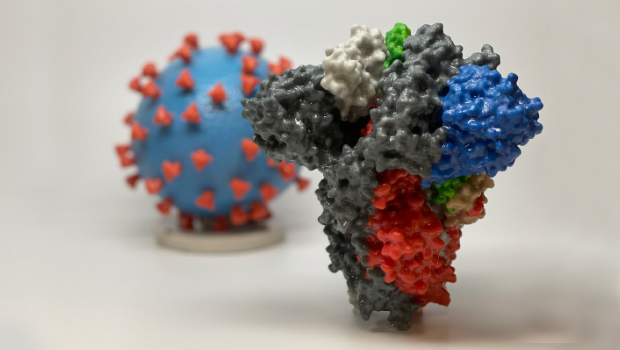COVID-19 research at KPWHRI
Scientists at Kaiser Permanente Washington Health Research Institute (KPWHRI) are on the forefront of efforts to understand, prevent, diagnose, and treat COVID-19. This includes vaccines, medications, forecasts, and impacts of the virus on various health conditions.
Vaccine trials
Vaccine Trial Registry
Vaccine safety monitoring
Studies now enrolling Kaiser Permanente Washington members
Research on COVID-19 risk factors and disparities
Other COVID-19 studies
Vaccine trials
KPWHRI builds on its background of longstanding participation as a Vaccine and Treatment Evaluation Unit and collaboration with the Centers for Disease Control and Prevention (CDC) and the National Institute of Allergy and Infectious Diseases (NIAID), among other partners, to help develop vaccines to prevent COVID-19. Our work includes the following:
NIH-Moderna vaccine
On March 16, 2020, KPWHRI gave the world’s first-ever injection of an investigational vaccine for COVID-19 to volunteers in a phase 1 clinical trial led by Senior Investigator Lisa A. Jackson, MD, MPH.
The vaccine — which was co-developed by the National Institutes of Health (NIH) and Moderna Inc. — was well tolerated and generated an immune response that exceeded the average responses from a group of people recovering from the disease, according to a New England Journal of Medicine report on the phase 1 trial findings. After the trial was expanded to include adults 56 years and older, a second paper was published in the New England Journal of Medicine, reporting that the vaccine was well-tolerated and generated a strong immune response in older adults.
On July 27, 2020, a phase 3 trial was launched to test the effectiveness — and continue to test the safety — of the NIH-Moderna vaccine. KPWHRI was one of 100 locations in this trial, which completed participant visits in November 2022. A review of the phase 3 data found that the vaccine is safe and effective at preventing symptomatic COVID-19 in adults, with an efficacy rate of 94.1%.
Additional evidence of the vaccine’s benefits were reported Dec. 3, 2020, in a letter in the New England Journal of Medicine co-authored by Dr. Jackson. Based on data from the phase 1 clinical trial, investigators found that the vaccine continued to provide a significant immune response 119 days after first vaccination and 90 days after second vaccination in 34 healthy adults.
On the strength of these and other findings, the U.S. Food and Drug Administration approved an emergency use authorization of the NIH-Moderna vaccine on Dec. 18, 2020.
Janssen vaccine
On Nov. 18, 2020, KPWHRI began enrolling volunteers in another phase 3 clinical trial to evaluate the COVID-19 vaccine made by Janssen Pharmaceutical Companies of Johnson & Johnson.
Mix-and-match COVID-19 vaccine-booster trial
KPWHRI and other research centers in the Infectious Diseases Clinical Research Consortium are assessing the use of different boosters that may or may not match the type of vaccine that participants received earlier.
Preliminary clinical trial results found that, for adults who previously received a full regimen of the NIH-Moderna, Pfizer-BioNTech, or Johnson & Johnson COVID-19 vaccines, an additional booster dose of any of these vaccines was safe and prompted an immune response.
The trial has now expanded to explore the possible benefits of the Novavax vaccine as a booster for people who have gotten the Moderna, Pfizer, or Johnson & Johnson vaccines for their initial series.
People interested in taking part in this and other vaccine research at KPWHRI can join our Vaccine Trial Registry (see below for more information).
Additional information about the trial is available on the clinicaltrials.gov website, maintained by the National Library of Medicine at the National Institutes of Health.
COVAIL booster shot trial
In spring 2022, KPWHRI joined a phase 2 clinical trial evaluating various second COVID-19 booster shots. The trial aims to understand if different vaccine regimens — prototype and variant vaccines alone and in combinations — can broaden immune responses in adults who already have received a primary vaccination series and a first booster shot.
The study, known as the COVID-19 Variant Immunologic Landscape (COVAIL) trial, is sponsored by the National Institute of Allergy and Infectious Diseases (NIAID), part of the National Institutes of Health. KPWHRI is one of 24 clinics across the country participating in the trial.
TOP OF PAGE
Vaccine Trial Registry
Interested in volunteering for a vaccine trial? KPWHRI has established a registry to collect information from people in the Seattle area who want to participate in current and future trials. Potential volunteers can contact the registry at vaccine.kpwashingtonresearch.org.
TOP OF PAGE
Vaccine safety monitoring
KPWHRI researchers are working with the Centers for Disease Control and Prevention (CDC), the U.S. Food and Drug Administration (FDA), and colleagues in other KP regions and other health systems on projects that monitor the safety and effectiveness of the vaccines now being distributed to the general population. To learn more, see KP biostatisticians help monitor COVID-19 vaccine safety.
TOP OF PAGE
Studies now enrolling Kaiser Permanente Washington members
Kaiser Permanente Washington members may be contacted for possible participation in the following COVID-19 studies:
Washington Respiratory Virus Vaccine Study and Self-Swab Respiratory Virus Study
For this study, now in its 12th season, KPWHRI researchers are contacting select patients who are experiencing cold- or flu-like illness and seeking care at Kaiser Permanente Washington Urgent Care centers. When people agree to join the study, study staff collect a nasal and throat swab that will be tested for flu, COVID-19, and other respiratory viruses. The study team is also recruiting Kaiser Permanente Washington patients by telephone to reach people who might have visited other testing sites. When joining the study after being contacted by phone, participants are sent a kit to self-collect a swab. This study allows researchers to explore how many people get sick with flu or COVID-19, what kinds of symptoms they have, how risk varies across populations, and what factors increase the risk of severe illness.
TOP OF PAGE
Research on COVID-19 risk factors and disparities
KPWHRI has launched a research project to evaluate risk factors for COVID-19 with Kaiser Permanente Colorado and Kaiser Permanente Northwest. The research collaboration follows a KPWHRI study, published in the American Journal of Hypertension, finding no association between the use of angiotensin-converting enzyme (ACE) inhibitor or angiotensin receptor blocker (ARB) medications and the risk of COVID-19 infection or hospitalization. The multi-site effort, which is being supported by the Garfield Memorial Fund, includes 3 inquiries:
- Whether oral contraceptives and hormone replacement therapy affect risk of COVID-19 infection or severe disease
- Whether diabetes and diabetes medications affect risk of COVID-19 infection or severe outcomes
- An analysis of racial and ethnic disparities in COVID-19 infection rates and severity, which found that higher risks of COVID-19 infection drive disparities in severe COVID-19 outcomes among Black/African American and Hispanic/Latina/Latino groups
TOP OF PAGE
Other COVID-19 studies
KPWHRI is a major contributor to the understanding of the spread of COVID-19 in Washington state, because researchers have access to comprehensive information about a large real-world population. KPWHRI has also provided a variety of resources and support to the Kaiser Permanente Washington care-delivery system to help prevent, screen for, and treat COVID-19.
- Predictive analytics to identify Kaiser Permanente Washington Medicare-age patients at highest risk for complications of COVID-19, so care providers can proactively reach out to these patients offering care and support
- Consultation to Washington state’s COVID-19 Health System Response Management team in developing a database to track hospital and intensive care unit (ICU) use statewide
- Helping Kaiser Permanente Washington’s newly formed Business Command Center to understand, improve, and evaluate the “Virtual First” care model that evolved from the system’s rapid COVID-19 response
- Rapidly reviewing scientific evidence related to COVID-19 care
- Contributing to research that tied a surge in COVID-19 variants to a specific mutation, based on surveillance of COVID-19 tests at Kaiser Permanente Washington
- Exploring how the virus affects physical and mental health, as well as how it affects care for conditions such as depression and anxiety, cancer, chronic pain, diabetes, and heart disease
- Working with Kaiser Permanente Washington Community Health and various community partnerships to identify and share resources with care providers in the region’s federally qualified health centers, including in-clinic workflows for COVID-19 and collaboratives to plan for emerging social needs resulting from the pandemic
In addition, the many Kaiser Permanente enrollees who participate in the Kaiser Permanente Research Bank are providing blood samples and medical information that will be useful in the organization's ongoing COVID-19 research nationally. The Research Bank has collected COVID-19 survey data on biobank participants that is available for research use.
TOP OF PAGE
Vaccine research
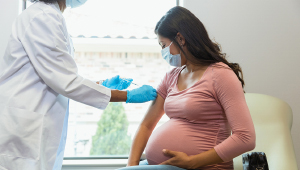
COVID-19 vaccines safe for people who are pregnant
New study supports a growing body of data that shows the vaccines are safe during pregnancy.
COVID-19 treatments

New report supports value of COVID-19 drugs
A team led by KPWHRI's Kai Yeung, PharmD, PhD, reviewed trial results for cost-effectiveness of 3 treatments.
New clinical trial
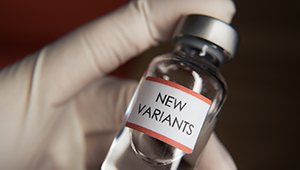
NIAID-sponsored study evaluates second COVID-19 booster shots
KPWHRI joins trial that includes multiple variant vaccines.
COVID-19 vaccines
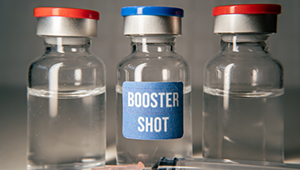
Trial confirms safety of mix-and-match COVID-19 booster
Lisa Jackson, MD, MPH, explains results support boosting with Moderna, Pfizer, or Johnson & Johnson vaccine.
COVID-19

Greater infection risks linked to COVID-19 disparities
New work by Susan Shortreed, PhD, finds infection risks drive worse outcomes for some racial and ethnic groups.
COVID-19 vaccines
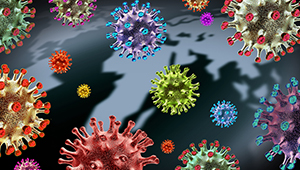
Moderna vaccine has durable response against variants
Findings in Science magazine called “encouraging” for use of vaccine against Delta and other emerging variants.

